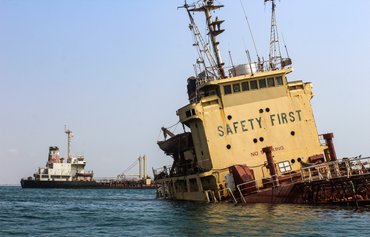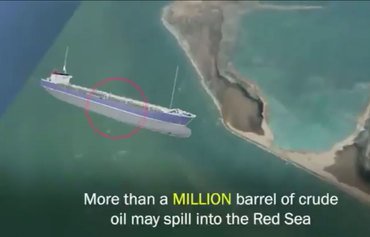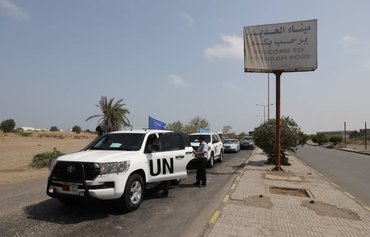The Iran-backed Houthis (Ansarallah) on Sunday (July 12th) gave UN inspectors permission to inspect a decaying oil tanker abandoned off the Red Sea coast.
But the move, which came just days ahead of an extraordinary UN Security Council session to discuss the matter slated for July 15th, was met with deep skepticism by the Yemeni government.
According to Yemen's Foreign Ministry, the Houthis' consent to give UN experts access to the Safer floating storage and offloading (FSO) terminal is a "bluff" aimed at alleviating international pressures on the militia.
The 45-year-old terminal, moored off Ras Isa port in Houthi-controlled al-Hodeidah province, contains 1.14 million barrels of crude oil and has gone without maintenance for more than five years.
There are growing concerns that worsening corrosion could result in an oil spill that would create an environmental and economic disaster.
The Houthis have previously blocked efforts to send inspectors to assess Safer's condition.
During a Sunday meeting with US ambassador to Yemen Christopher Henzel, Foreign Minister Mohammed al-Hadhrami urged the Security Council to pressure the Houthis to agree to a decisive solution that would avert a potential disaster.
He accused the Houthis of resorting to "bluffs" to avoid international pressure.
"For years, the government has been calling for a UN team to be granted access to assess the FSO terminal, but the Houthis have met this with stubbornness and refusal, in an attempt to hijack the terminal and make political gains," he said.
UN spokesman Stéphane Dujarric confirmed that the Houthis had on Sunday agreed to the deployment of a UN mission on site.
"We are definitely following up on all the details with them now, and hope logistical arrangements will be quickly completed so this work can begin," he said.
"The assessment mission will conduct useful light repairs and help determine the next steps," he added, noting that the UN is in discussion with the two sides on selling the crude oil and splitting the proceeds between them.
Houthis' political games
Commenting on the Houthis' latest move, political analyst Faisal Ahmed told Al-Mashareq that in his opinion, the Houthis are politically and economically blackmailing the Yemeni government and international community.
"They have turned the terminal into a weapon to threaten Yemen, regional countries and international trade," he said.
"The Houthis had earlier agreed to allow a UN team to assess the tanker condition, but when the team arrived at Djibouti port, they backed down on their consent," he noted.
"The Yemeni government has accepted the UN special envoy's proposals for dealing with the Safer, including the use of oil sale proceeds in paying the salaries of state employees which have been suspended since 2016," he said.
He accused the Houthis of backing down on their previous promises and using the Safer FSO "to threaten the world to serve their interests and Iran's interests and strengthen their negotiation position and alleviate sanctions".
"The Houthis' statements on approval are part of efforts to calm the international community's anger and alleviate its resolutions, which are expected in the next UN Security Council session," he said.
"The Security Council has realised the magnitude of the disaster that may result from an oil spill, and that was why it accepted the Yemeni government's request to hold a session to discuss the issue," he said.
'Ticking time bomb'
Essential work on reducing explosive gases in the storage tanks has been neglected for years, with the latest problem emerging in May with a leak in a cooling pipe, AFP reported.
"The pipe burst, sending water into the engine room and creating a really dangerous situation," said Ian Ralby, CEO of IR Consilium, a global maritime consultancy which follows the vessel closely.
A team from Yemen's Safer Exploration and Production Operations, a public oil company partly controlled by the Houthis, sent divers in to fix the leak, narrowly avoiding the ship sinking, Ralby said.
If the vessel ruptures "you're going to have two catastrophes", said Lise Grande, the UN's humanitarian co-ordinator for Yemen.
"There is going to be an environmental catastrophe that is bigger than almost any other similar kind... and it is going to be a humanitarian catastrophe because that oil will make the port of al-Hodeidah unusable," she said.
Independent Yemen-based environmental group Holm Akhdar warned an oil spill could stretch out from the Red Sea to the Gulf of Aden and into the Arabian Sea.
The region's ecology would need over 30 years to recover from an oil spillage of that size, it said in a recent report, adding that about 115 of Yemen's Red Sea islands would lose their biodiversity and natural habitats.
An estimated 126,000 fishermen would lose their only source of income.
IR Consilium said any salvage operation after an oil spill would be greatly hampered by the coronavirus crisis.
"In the midst of a global pandemic and on the edge of a conflict zone, the chances of an early and adequate response are vanishingly small," it said in a report.
Doug Weir, research and policy director at the UK-based Conflict and Environment Observatory, said that without an independent assessment "it is impossible to determine when an incident might occur, or its form and severity".
"However the risks are clear, and the longer the dispute continues, the greater they become, and the more complex and expensive any salvage operation will be."
US Secretary of State Mike Pompeo warned last week that if the tanker ruptures "it will devastate the Red Sea ecosystem" and disrupt key shipping lanes.
"The Houthis must grant access before this ticking time bomb explodes," he said.

![Yemenis stand next to a well after a fire broke out near a crude oil pipeline near the Red Sea port of al-Hodeidah in this file photo from April 8th, 2017. [STRINGER/AFP]](/cnmi_am/images/2020/07/13/24959-Yemen-oil-spill-600_384.jpg)






